Sponges in the kitchen become mandatory for cleaning cooking utensils and utensils, but this dishwasher can be the dirtiest thing. The scientists published a study revealing how dense the surface of the sponge in the kitchen with microscopic bacteria.
To produce accurate calculations, the researchers did two ways. Previously experts only measured the amount of bacteria in dirty sponges in the laboratory stomach plate, but not all bacteria could grow in the medium.
The researchers then collected additional data from the donor sponge (a sample of 14 dishwashing sponges). Apparently, sponges are cleaned regularly in soapy water or dishwasher stores more bacteria called Moraxella osloensis.
Bacteria are common and harmless, but can cause infection in people with impaired immune systems.
According to Dr.Markus Egert, microbiologist, this study is not intended to cause fear, but still many readers are worried. "Our study is primarily to create awareness, not fear," he told the New York Times daily.
Although bacteria in dishwashing sponges are not always dangerous, but he thinks it's better to throw out the stinky ones, a sign that the bad bacteria are there.
The US Department of Agriculture also recommends buying new sponges as often as possible, as the washing machine is "difficult to clean."
"You should not be hysterical and afraid of kitchen sponges," Egert said. Even a sterile environment can make a person sick, he added. "But if you are sick or seriously ill at home, be more careful."
Kitchen is the most suitable place for cross contamination. However, you can also get sick from foods that are not well prepared or from mobile phones, as does a dirty sponge, experts say.
Everyone's bodily responses may be different for the same pathogens, such as holes that can damage a car but not on the other, says Kevin Sauer of Kansas State University, who has studied cross-contamination in the kitchen.
There are several things we can do to prevent the risk of bacterial transmission from dirty sponges, for example by using different sponges for different types of kitchen work, such as dish washing sponges are not put together with sponges cleaning the table. Replace sponges regularly, at least once a week.
To produce accurate calculations, the researchers did two ways. Previously experts only measured the amount of bacteria in dirty sponges in the laboratory stomach plate, but not all bacteria could grow in the medium.
The researchers then collected additional data from the donor sponge (a sample of 14 dishwashing sponges). Apparently, sponges are cleaned regularly in soapy water or dishwasher stores more bacteria called Moraxella osloensis.
Bacteria are common and harmless, but can cause infection in people with impaired immune systems.
According to Dr.Markus Egert, microbiologist, this study is not intended to cause fear, but still many readers are worried. "Our study is primarily to create awareness, not fear," he told the New York Times daily.
Although bacteria in dishwashing sponges are not always dangerous, but he thinks it's better to throw out the stinky ones, a sign that the bad bacteria are there.
The US Department of Agriculture also recommends buying new sponges as often as possible, as the washing machine is "difficult to clean."
"You should not be hysterical and afraid of kitchen sponges," Egert said. Even a sterile environment can make a person sick, he added. "But if you are sick or seriously ill at home, be more careful."
Kitchen is the most suitable place for cross contamination. However, you can also get sick from foods that are not well prepared or from mobile phones, as does a dirty sponge, experts say.
Everyone's bodily responses may be different for the same pathogens, such as holes that can damage a car but not on the other, says Kevin Sauer of Kansas State University, who has studied cross-contamination in the kitchen.
There are several things we can do to prevent the risk of bacterial transmission from dirty sponges, for example by using different sponges for different types of kitchen work, such as dish washing sponges are not put together with sponges cleaning the table. Replace sponges regularly, at least once a week.

No comments:
Post a Comment